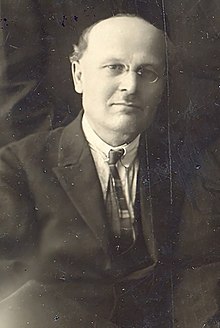
Aram Ilyich Khachaturian was a Soviet Armenian composer and conductor. He is considered one of the leading Soviet composers.

Stepan Georgevich Shaumian was an Armenian Bolshevik revolutionary and politician active throughout the Caucasus. His role as a leader of the Russian Revolution in the Caucasus earned him the nickname of the "Caucasian Lenin", a reference to Russian revolutionary leader Vladimir Lenin.
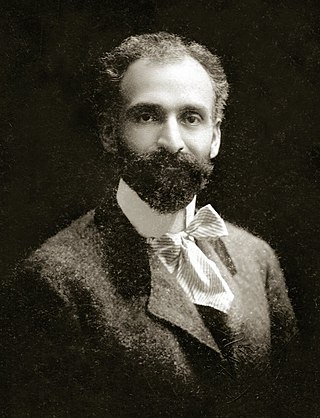
Hovhannes Tumanyan was an Armenian poet, writer, translator, and literary and public activist. He is the national poet of Armenia.
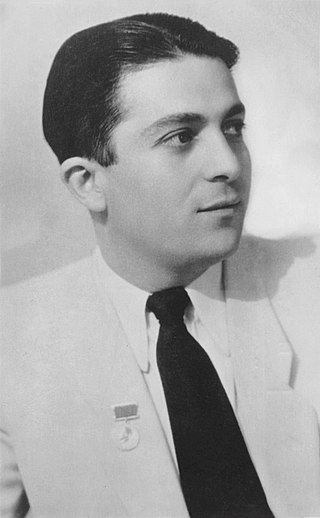
Rashid Behbudov was a Soviet and Azerbaijani singer and actor. He has been referred to as the "golden voice of Azerbaijan". He performed his songs in multiple languages.

Alfred Roubenovich "Avet" Terterian was an Armenian composer, awarded the Konrad Adenauer Prize.

Caucasus Germans are part of the German minority in Russia and the Soviet Union. They migrated to the Caucasus largely in the first half of the 19th century and settled in the North Caucasus, Georgia, Azerbaijan, Armenia and the region of Kars. In 1941, the majority of them were subject to deportation to Central Asia and Siberia during Joseph Stalin's population transfer in the Soviet Union. After Stalin's death in 1953 and the beginning of the Khrushchev Thaw, the Caucasus Germans were allowed to return, though only few did. Many assimilated and, after 1991, emigrated to Germany. Although the community today is a fraction of what it once was, many German buildings and churches are still extant, with some turned into museums.
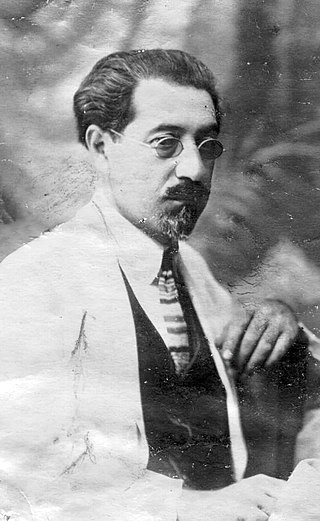
Armen Tigranian or Tigranyan or Dikranian was an Armenian composer, conductor and sociocultural activist. His best-known work is Anoush, premiered in Alexandropol in 1912. It is the first opera ever performed in Armenia.

Alexander Afanasyevich Spendiaryan was an Armenian music composer, conductor, founder of Armenian national symphonic music.
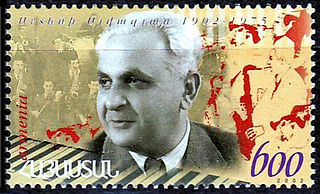
Artemi (Harutyun) Ayvazyan was a Soviet Armenian composer, conductor, founder of the Armenian State Jazz Orchestra, and People's Artist of Armenia (1962).

Jivani, born Serob Stepani Levonian, was an Armenian ashugh (bard) and poet.
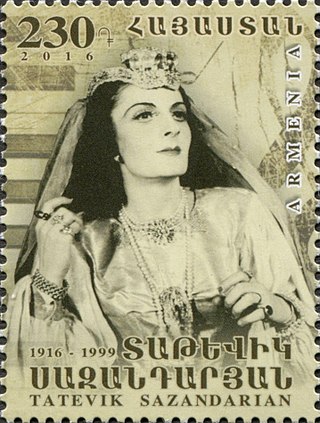
Almast is the only opera of the Armenian composer Alexander Spendiaryan.

Sargis Barkhudaryan was an Armenian composer, pianist and educator.

Makar Grigori Yekmalyan was an Armenian composer.
Shmavon G. Mangasarov was a Soviet artist of Armenian ethnicity. He was one of the founders and members of the Azerbaijan Society of Revolutionary Art Workers. He was also a member of the "USSR Union of Artists" and was named the "Honored Artist of Azerbaijan"
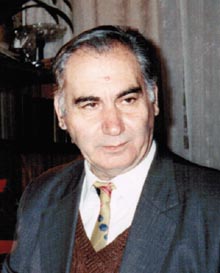
Nikoghos Tahmizian was an Armenian musicologist, theorist and historian. His professional accomplishments were to decipher neumes (khaz) of Armenian church music, analyze the musical theory of old Armenia and research the life and works of Armenian composers from medieval times to modern era.

Anoushavan Ter-Ghevondyan was an Armenian composer, pedagogue, and sociocultural activist. His father was the photographer Grigor Ter-Ghevondyan; and his daughter, pianist Heghine Ter-Ghevondyan.
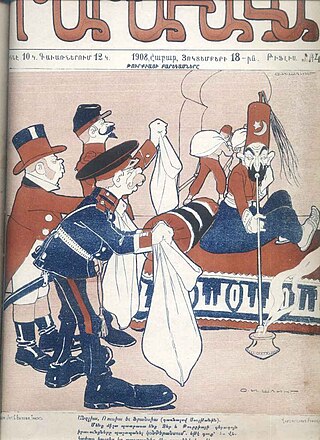
Khatabala was a twelve-page Armenian satirical periodical published in Tiflis (Tbilisi) from 1906 to 1916 and again in 1922 and 1925–26 in the Armenian and occasionally Russian and Georgian languages. It was founded by Astvatsatur Yeritsyan (1872–?), who edited the periodical along with Ashot Atanasyan (1870–1941). The name of Khatabala comes from a popular word used by Armenians, Georgians, Azerbaijanis and Persians meaning misfortune, setback, or troubles, ultimately derived from the Arabic words ḵaṭā 'error' and balāʾ 'trouble, tribulation'.
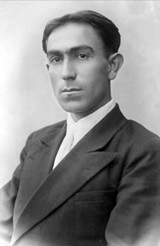
Bakhshi Galandarli was an Azerbaijani theatrical figure, actor and director. He was an Honored Art Worker of the Armenian and Azerbaijan SSRs.

Ali Ali oghlu Taghizade was an Azerbaijani-Soviet revolutionary and statesman, Chairman of the Supreme Soviet of the Azerbaijan SSR (1959–1963), People's Commissar of Social Security of the Armenian SSR (1929–1932), First Secretary of the Vedi District Party Committee (1933–1935).
